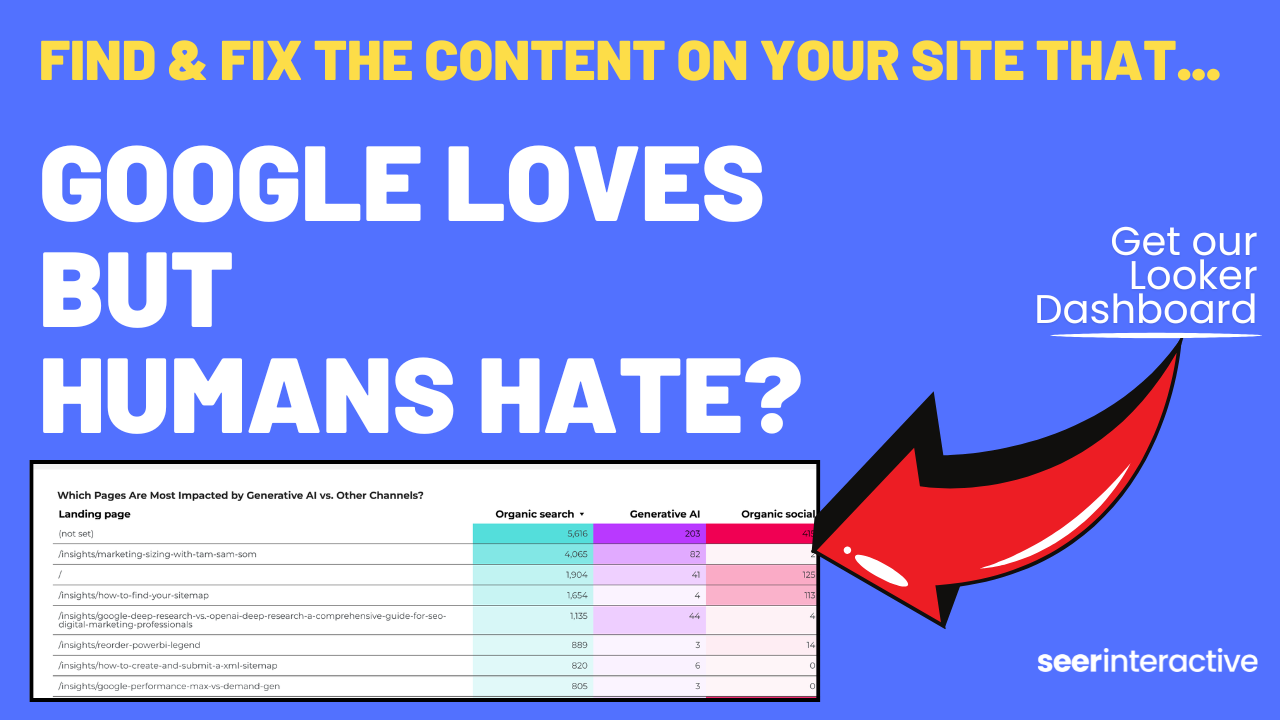In 2024, artificial intelligence (AI) is not just a trendy term but a valuable asset in your marketing arsenal. If you're eager to embrace the future but find the technical jargon overwhelming, look no further. Together, we'll demystify the complexities and shed light on some technical concepts. Our goal isn't to become experts, but to know enough fundamentals to successfully leverage this new technology as part of our daily workflows and processes.
What is Artificial Intelligence?
I promise this isn't an attempt to rank for "what is artificial intelligence."
Yes, we're starting at the basics here, but in my experience there are many misconceptions about what artificial intelligence is. This is my favorite definition:
Artificial Intelligence is the technology that enables machines to think, learn, and make decisions like humans.
Artificial intelligence has been around for a long time, baked into much of the technology we use today. This is part of where confusion stems from, in my opinion. If you aren’t steeped in this world, it’s hard to comprehend what’s truly shiny and new vs what’s existed for years.
Examples of Artificial Intelligence we use every day
- Recommendations on Streaming Services: Netflix has baked AI into it’s offering for years by making recommendations based on data collected about your preferences
- Email Spam Filters: Remember how much spam we used to get via email? Sure, we still get a decent amount. And many of us have gotten smarter about who we share our email addresses with. Still, take a peek at your Spam folder and marvel in the AI technology that kept all that garbage away from you.
- Voice Assistants: It’s a bit funny to hear marketing claims for “the first AI phone” launching this year, when in reality just about every smart phone has a voice assistant that runs on AI.
- Facial Recognition: AI fuels the process that evaluates a photo taken of yourself and confirms it matches the image on record for you.
- Autocorrect: I can hardly remember a time when I didn’t have autocorrect on my phone. Seems like AI has been integrated into our lives for a pretty ducking long time!
So, we’ve established that AI can objectively be considered “old news.” But, how does that square with the fact that AI in 2024 is the most exciting topic to discuss? The answer lies in the advancements (and speed thereof) made in the past year.
Foundational AI Definitions for Marketers
These are concepts that have been around for years, some of which are especially relevant to search marketers and content strategists. But, just because you’ve been aware of something for a long time, doesn’t mean you fully understand it. And, if you aren’t actively researching this technology, you may not be aware of the acceleration that’s taken place in so many fields over the course of the past few years.
In this section I will break down the concepts, including their definitions, when the technology was first introduced, the concept’s relevance to artificial intelligence and the concept’s relevance to marketing.
What is Machine Learning (ML)?
- Definition: Machine learning is a method where machines learn and improve from experience without being explicitly programmed.
- Inception: Mid-20th century via work by Alan Turing, who’s paper “Computing Machinery and Intelligence” proposed the idea that a machine could learn and think.
- Contextual Relevance to AI: The technology today that can think and learn as humans do can only achieve this due to its ability to learn via Machine Learning.
- Contextual Relevance to Marketing: Machine Learning is the backbone of
data-driven marketing strategies. It enables marketers to efficiently analyze large volumes of data for insights, automate routine tasks, and optimize marketing campaigns in real-time. - Day-to-day Example: The improvements in spam filtering over the years demonstrate how machine learning is part of your day-to-day already.
What is Deep Learning?
- Definition: Deep Learning is an advanced subset of machine learning that involves algorithms inspired by the structure and function of the brain, called artificial neural networks. It is known for its ability to process large amounts of complex data and make intelligent decisions.
- Inception: The concept of Deep Learning dates back to the 1950s and 1960s with the development of the earliest neural networks. However, it gained significant traction in the 21st century, as computational power and data availability increased.
- Contextual Relevance to AI: Deep Learning is a cornerstone of modern AI. It's responsible for major advances in areas like image and speech recognition, natural language processing, and autonomous vehicles. Its ability to learn from vast datasets has been pivotal in advancing AI capabilities.
- Contextual Relevance to Marketing: In marketing, Deep Learning powers advanced customer segmentation, predictive analytics, and personalization strategies. It's instrumental in analyzing consumer behavior, optimizing marketing campaigns, and enhancing customer experiences. In 2024, its role in providing deep insights and automating complex tasks is invaluable for marketers.
- Day-to-day Example: Language translation services like Google Translate uses deep learning to create real-time translations.
What are Neural Networks?
- Definition: Neural networks are algorithms inspired by the human brain, used to recognize patterns and interpret data.
- Inception: The concept of neural networks dates back to the 1940s and 1950s, with the pioneering work of scientists like Warren McCulloch and Walter Pitts. However, their practical applications and development accelerated significantly with the advent of more powerful computers and larger datasets in the late 20th and early 21st centuries.
- Contextual Relevance to AI: Neural networks are fundamental to the field of AI, providing the framework for many advanced machine learning models. They are especially important in complex tasks like image and speech recognition, natural language processing, and decision-making processes.
- Contextual Relevance to Marketing: Neural networks have a significant impact on marketing in 2024 by powering advanced analysis and predictive modeling. Their ability to process and learn from vast amounts of consumer data is key to developing more effective and personalized marketing strategies.
- Day-to-day Example: Financial institutions leverage neural networks to monitor for real-time signs of fraudulent activity, including learning from historical data and identifying patterns.
What is Natural Language Processing (NLP)?
- Definition: Natural Language Processing (NLP) is a field of artificial intelligence that focuses on enabling computers to understand, interpret, and respond to human language in a way that is both meaningful and useful. It involves the interaction between computers and humans using natural language.
- Inception: The roots of NLP can be traced back to the 1950s and 1960s with the development of early computational linguistics. However, it gained significant momentum in the late 20th and early 21st centuries, particularly with the integration of machine learning techniques.
- Contextual Relevance to AI: NLP is a critical component of AI, bridging the gap between human communication and computer understanding. It's fundamental for developing AI systems that can engage in human-like dialogue, translate languages, summarize texts, and extract meaningful information from unstructured data.
- Contextual Relevance to Marketing: For marketers in 2024, NLP is a game-changer. It enhances customer engagement through intelligent chatbots, sentiment analysis, and automated customer service. Additionally, innovation that was previously exclusive to those who could code can be democratized to anyone who can clearly communicate.
- Day-to-day Example: The ease of use in communicating with chatbots like ChatGPT is a great example of the power of natural language processing
What are Transformers?
- Definition: Transformers are a type of neural network architecture primarily used in the field of natural language processing (NLP). They are designed to handle sequential data, like text, more efficiently than previous models.
- Inception: Introduced in a 2017 paper titled "Attention Is All You Need" by researchers at Google, transformers marked a significant advancement in NLP.
- Contextual Relevance to AI: Transformers are pivotal in AI for processing and understanding language at scale, leading to breakthroughs in translation, summarization, and question-answering systems.
- Contextual Relevance to Marketing: For 2024’s marketers, transformers power advanced content generation and analysis tools, enhancing customer engagement and content relevance.
- Day-to-day Example: If you’ve played around with tools like Jasper.ai to create content with specific tones or in unique styles, you’ve seen the power of transformer technology first hand.
What is a Large Language Model (LLM)?
- Definition: A Large Language Model (LLM) is an advanced type of artificial intelligence algorithm, trained on vast datasets of text. It can generate, understand, and interpret human language with a high degree of proficiency.
- Inception: The concept of language models has been evolving since the late 20th century, but the term "Large Language Model" gained prominence especially with the development of models like OpenAI's GPT (Generative Pre-trained Transformer) series in the 2010s.
- Contextual Relevance to AI: LLMs represent a significant milestone in AI, exemplifying the shift towards models that can process and understand language in a way that mimics human understanding. This capability is central to numerous AI applications, from automated customer service to content creation.
- Contextual Relevance to Marketing: For marketers, LLMs are revolutionary. They enable sophisticated content generation, audience engagement through chatbots, insightful data analysis from customer interactions, and more personalized marketing strategies. They're essential for understanding and predicting consumer behavior and trends in 2024.
- Day-to-day Example: ChatGPT, Claude, and Llama are all examples of popular large language models.
What is Retrieval Augmented Generation (RAG)?
- Definition: Retrieval Augmented Generation is a method in machine learning that combines the ability to retrieve information from databases or documents (retrieval) with the capability to generate new content based on that information (generation).
- Inception: RAG is a relatively recent development in AI, emerging prominently in the late 2010s and early 2020s as a way to enhance the quality and relevance of machine-generated text.
- Contextual Relevance to AI: RAG represents a significant advancement in AI, especially in fields like natural language processing. By integrating retrieval capabilities with generation, it allows AI systems to produce more accurate, contextually relevant, and informative content.
- Contextual Relevance to Marketing: In the marketing world of 2024, RAG plays a crucial role in content creation and customer interaction. It enables the development of more sophisticated chatbots and virtual assistants that can provide accurate, real-time responses to customer queries. This is a critical thing for search marketers to understand, as there are direct correlations between ranking in traditional search engines and the current RAG processes that platforms like ChatGPT and Bard use.
- Day-to-day Example: If you’ve seen ChatGPT “searching with Bing” then you have seen RAG in action!
What is Generative AI (GenAI)?
- Definition: Generative AI refers to artificial intelligence algorithms designed to create new content, ranging from text and images to music and code. Unlike traditional AI, which analyzes and interprets data, generative AI can produce novel, creative outputs.
- Inception: The concept began gaining traction in the early 21st century, with significant advancements in neural networks and machine learning techniques.
- Contextual Relevance to AI: Generative AI is a transformative force in AI, pushing the boundaries of creativity and innovation. It's crucial for tasks that require a high degree of creativity and adaptation, such as designing new products or generating realistic simulations.
- Contextual Relevance to Marketing: We’ve previously referenced Harvard Business Review’s concept of the impact GenAI can have on WINS: Words, Images, Numbers, Sounds. For marketers in 2024, Generative AI is a powerhouse tool. It enables the creation of unique and engaging content. This technology allows for rapid experimentation and augmentation of tasks only humans could previously complete, helping marketers to stay ahead in a dynamic and competitive landscape.
- Day-to-day Example: The LLMs mentioned above are all good examples of Generative AI. Additionally, tools like Midjourney offer a way to use Generative AI to create visuals.
What is Artificial General Intelligence (AGI)?
- Definition: Not to be confused with GenAI, Artificial General Intelligence (AGI) is a type of AI that has the ability to understand, learn, and apply its intelligence to a wide range of problems, much like a human being. AGI can adapt to a wide variety of tasks without human intervention.
- Inception: AGI is a concept that has been discussed since the early days of AI research in the mid-20th century, but it remains largely theoretical and aspirational.
- Contextual Relevance to AI: AGI represents a future goal for AI development, where machines could perform any intellectual task that a human can. It's seen as the next major leap forward in the field, potentially leading to significant advancements in every area of human endeavor.
- Contextual Relevance to Marketing: While AGI is not yet a reality in 2024, its potential impact on marketing is immense. It could lead to highly adaptive, intelligent systems capable of executing complex, multi-faceted marketing strategies, providing deep insights into consumer behavior, and innovating at a pace far beyond current capabilities.
- Day-to-day Example: N/A
Resources for Learning More
If you’re as fascinated as I am by this technology, you may be interested in learning more. Here are a few resources I recommend for any marketers who want to ensure they keep their finger on the pulse of AI advancements that may impact them in the near future.
- The Marketing AI Show: A fantastic weekly podcast that covers all of the latest AI news relevant to marketers.
- The Marketing AI Newsletter: If you prefer to read your news, this is an even more robust collection of AI updates relevant to marketers.
- The Superhuman Newsletter: A daily newsletter with a great curation of tech news, heavy on AI updates
- Financial Times’ Generative AI Asset: This is an interactive asset that does a great job explaining how LLMs work.
- Confluence: The Intersection of AI and Communication: This is a weekly newsletter that does a great job of reviewing the latest trends and inferring how they will impact corporate communication.
- ChatGPT-4: If you aren’t already using ChatGPT, you’re late to the party. If you’re using the free version, you aren’t getting close to the full value that it can deliver. Treat the chatbot as your research assistant, ready to rush off and compile a brief for you on any topic you can think of.
Lastly, if you aren’t already subscribed to the Seer newsletter, consider signing up to get insights like this delivered to your inbox.
Please note that this post was created with support from ChatGPT-4.


